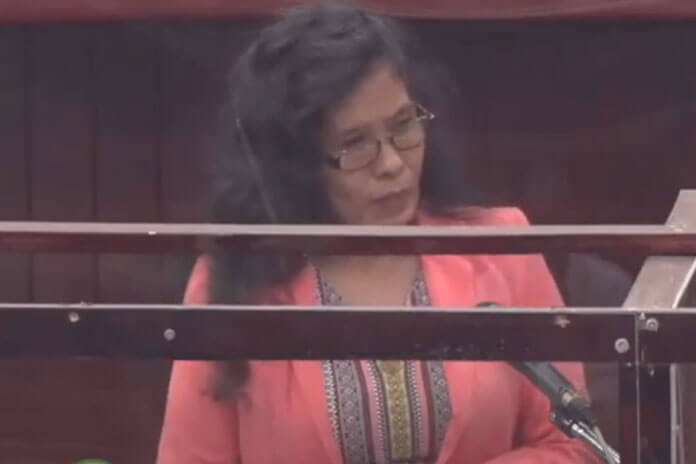BELIZE CITY, Mon. June 7, 2021– During last week’s Senate meeting, members of the upper house voted on the motion to issue final approval for a reduction of the salaries of government-paid workers. The Public Sector Emoluments and Allowances Reduction Bill 2021 was passed with an amendment after coming back from a committee consisting of all members of the Senate. This bill will now go back to the House of Representatives before being gazetted into Belize’s law books.
The salary cuts were approved in the 2021/2022 budget that was read in the House of Representatives in early April. These cuts are an effort to secure yearly savings of 80-million dollars for the government of Belize for the next three years if necessary, according to the Briceño administration. All public servants, government-paid teachers, and parliamentarians will be subject to the cuts at varying levels. The Public Sector Emoluments and Allowances Reduction Bill 2021 was passed in the Senate to set up the legal framework to institute the cuts, according to Senator Eamon Courtenay.
The Joint Unions have been at odds with the government of Belize for weeks over the salary cuts, and have staged multiple mass demonstrations to express their opposition to them and call for the implementation of good governance legislation. The government, however, in the 2021/2022 budget, pushed through its proposed salary cuts at the height of consultations and negotiations with the Joint Unions.
National president of the Belize National Teachers Union (BNTU) and representative for the unions in the upper house, Senator Elena Smith was at the forefront of the fight against the salary cuts. She stated during the Senate meeting that while the cuts may seem to be proportional and across-the-board, the union members she represents stand to be most affected.
“It is unfair to expect us, the persons to be most affected by this cut, because yes, you can say the Ministers are being cut too, but we are being cut by [ten] percent, and they are being cut by [fifteen] percent, but ten percent of my salary means a whole lot, because I have no other allowance that I can fall back on. So, it means that my family will be in a worse position than some persons who will be able to fall back on some allowances,” Senator Smith explained.
She pointed out that while the government is claiming to be fiscally strapped, the public continues to observe the hiring of new persons in high offices within government.
She remarked, “You are telling me that our situation is so bad that we must cut your salary, but you must provide the same service. Yet, we see that hirings continue. Yet, we see that we are spending other things that we should be cutting back on.”
Lead UDP Senator, Michael Peyefitte, in his address to the Senate, said that his party is not in support of the pay cuts, since, according to him, it is not in the best interest of the economy at this time.
“Madam President, how can I support a bill that cuts my pay? I see the National Assembly — we already have a massive monthly salary of $900, and it’s going to be slashed, Madam President. I cannot, in good spirit, with the hard work that we put in, and my fellow senators, agree to such a bill. Madam President, we just reiterate our objection to any kind of withdrawal of money out of the hands of people who need to spend in a downed economy. The United Democratic Party does not accept that we need to cut people’s pay. We don’t think that this is in the best interest of the economy at this time.” Senator Peyrefitte said.
At the time of the Senate’s budget debate, the 13th senator, representative for the NGO community, Osmany Salas, abstained from voting. He remarked that the NGO’s are conflicted about the matter and have shifted positions several times. However, he noted in his address, “[the] good standing members who have weighed in on this matter agree that we should support this bill.”
The business community maintains its position in support of the salary cuts, however. Business Senator Kevin Herrera stated in his address to the Senate, “I wish we had an alternative. I wish I could have suggested one. I’ve looked at the numbers. I’m trained in looking at financial information. I just don’t see an alternative in the short term, and it is the short term that bothers us.”
The government is opting to engage in a homegrown plan of recovery, refusing to sign onto an IMF standby agreement, Senator Eamon Courtenay pointed out during the debate.
He started by saying, “Madam President, as I said in the budget debate, absolutely no one in this Senate today on either side and the social partners takes any joy in passing this piece of legislation.”
He said that they are fully aware of the pain that the salary cuts will cause across the country, but emphasized that it is necessary to avoid the IMF’s plan for retrenchment, tax increase, and devaluation. He remarked that if the other senators believe that the decision to cut salaries is a “bukut”, then they can “choose an IMF disaster.”
He added, “We have chosen the lesser of some evils, three evils. We can continue to borrow till we go broke, we can go down the IMF road, or we can choose this homegrown approach.”

